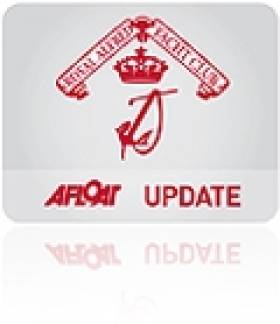Displaying items by tag: Royal Alfred Yacht Club Baily Bowl
There was a familiar ring to this evening's Royal Alfred prizegiving roll call where Baily Bowl trophies were presented to top ranked sailors in four separate classes.
A weekend of one design class action produced a testing five race series. Light to medium north-westerlies prevailed with some big shifts coming off the Dublin bay shoreline making for plenty of place changes both upwind and downwind on well laid, windward-leeward courses.
The competition was hosted by the National YC due to marina replacement works at the Royal St. George YC.
SB3's and Dragons raced on one course in the middle of the bay while the Flying 15's and Squibs race in Seapoint Bay, so close to the Sandymount shore on Saturday that the weather mark was laid in only nine foot of water.
The event - were it required - confirmed that the SB3 is the most popular one design in the country, the class producing a fine fleet of 22 boats almost twice the size of the other three fleets.
Allthough Howth's Ben Duncan, sailing Sharkbait, continues his domination of the class it was good to see Bray Sailing Club''s Marty Cuppage in third overall, one place behind Belfast Lough's David Cheyne.
Local favourite Sean Craig sealed his fate on Saturday when he counted a premature start penalty (OCS) in the afternoon race but neverthless a final race win today moved him to sixth overall.
If the SB3 is the most popular class then it has most likely been at the cost of the Dublin Bay Dragon fleet where weekend numbers did not make double figures. Rick Johnson sailing Diva continued his recent Dublin Bay form beating Andrew Craig's Chimaera who finished second and Peter Bowring's Phantom in third.
The National Yacht Club's John Lavery was the clear winner (three race wins) of the Flying fifteens where a dozen boats sailed. It was Northern Ireland travellers Andy Martin in second and Brian McKee third in a fleet otherwise made up from the local Dublin Bay class. It was disappointing turnout in some respects because the local fleet numbers almost 30 boats and the Baily Bowl doubled as a class championship.
In preparation for next month's British and Irish Squib Championships at the same venue the Royal St. George's Vincent Delany took a well earned win with three race wins in his final tally. Peter Wallace sailing Toys for the Boys was second and Lola (Frank Whelan) was third.
























































